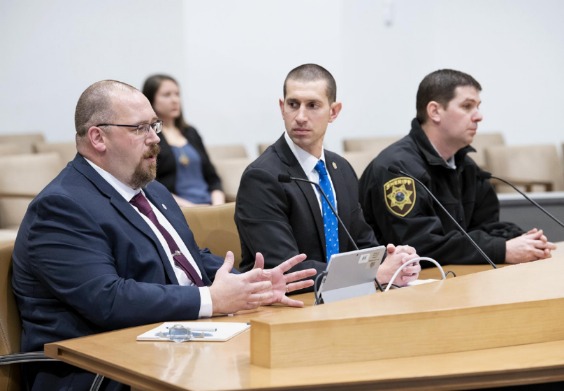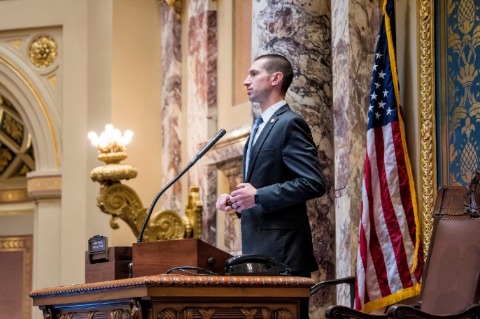Greetings from the Capitol,
The last few weeks here at the Capitol have been incredibly busy with floor session, committee hearings, constituent visits, and many other meetings. The Senate has already passed two bills, funding for disaster relief and precautionary funding for a potential coronavirus outbreak, and we have started to make significant progress on a number of other important bills to help Minnesotans, including a bill that I introduced to eliminate Social Security income taxes, and Rural Finance Authority (RFA) funding, which provides low-interest loans to farmers.
Helping communities recover from natural disasters
The first bill to pass off the Senate floor this year was a bill that I have been working on with Representative Gene Pelowski to replenish Minnesota’s Disaster Assistance Contingency Account. Last year, some Minnesota communities experienced worse than anticipated flooding. As a result, the disaster relief account is running a $3 million deficit. The bill that passed the Senate will add $30 million to the account, which will take care of the deficit as well as help prepare the state for future natural disasters. Of course we hope they don’t happen, but we want to be prepared if they do. Experts are saying there is potential for significant flooding problems again this spring, and other natural disasters like tornadoes, straight line winds, and thunderstorms can strike at a moment’s notice.
One of the people who came to St. Paul to testify on behalf of the bill was Winona County Emergency Management Director Ben Klinger. I thank him for his help in getting this done, and for the unanimous support of my colleagues in the Senate. The bills still needs to pass the House of Representatives and I hope we are able to send this bill to the governor as soon as possible for his signature.

Eliminating Social Security income taxes
If the feedback I get from constituents is any indication, one of the most unpopular laws we have on the books in Minnesota is the tax levied on retirees’ Social Security income. Recently I’ve been asked about this more than any other tax-related issue, by far. And for good reason: Minnesota is one of only 13 states that taxes Social Security income. Most other states recognize that it is effectively a double tax – you pay when it is taken out of your paycheck throughout your career, and you pay again when you finally retire and collect benefits. It’s one significant reason Minnesota regularly ranks as one of the least-friendly states for retirees.
In the 2017 tax bill, we made some progress in reducing the tax, but I recently introduced a bill to fully and completely eliminate Social Security income taxes. It’s time Minnesota catch up to the rest of the country and give retirees some well-earned relief.
Strengthening Minnesota’s farmers and agriculture economy
This week the Senate will take up Senate File 3408, which provides $50 million for Rural Finance Authority (RFA) loans. This program offers low-interest loans to farmers for a number of activities, such as startup costs, debt restructuring, disaster recovery, and expanding operations.
Agriculture is not just important to southeastern Minnesota, it is also the backbone of our state’s economy. When farmers are strong, so is the entire state. Since 1986, the RFA has issued more than $270 million in low-interest loans and helped thousands of farmers deliver quality, affordable food to Minnesotans.
Coronavirus
The Minnesota Senate took very swift action to pass Senate File 3813, which appropriates $20.899 million in funds to the Public Health Response Emergency Account. The passage of this bill puts precautionary measures in place in the event of a coronavirus outbreak. The state now has its first cases of the virus, and the bill also helps make sure we are able to promptly treat those and any future cases, as well contain the disease before it spreads further. In the event the funds go unused or are reimbursed by the federal government, the money will automatically transfer back to the general fund.
The emergency funds will allow the Minnesota Department of Health, in collaboration with state and federal officials, to support disease investigation, monitor potential cluster outbreaks, provide information to the public, coordinate statewide response activities, and conduct laboratory analysis. Legislative leaders, the administration, and public health officials remain in frequent contact. I’m glad we were able to work in a bipartisan manner to get this funding done quickly.

Contact me
As always, if you have any questions, comments, or concerns, please don’t hesitate to contact me. Your feedback is extremely important to me and I encourage you to share your input. You can send me an email at sen.jeremy.miller@senate.mn or call my Capitol office at 651-296-5649. It’s a great honor to serve as your State Senator.
Finally, if you don’t already follow me on Facebook, please give my page a ‘Like’. This is a great way to stay on top of the latest news from the Capitol! Visit my page here: https://www.facebook.com/SenatorJeremyMiller/.
Sincerely,
Jeremy
